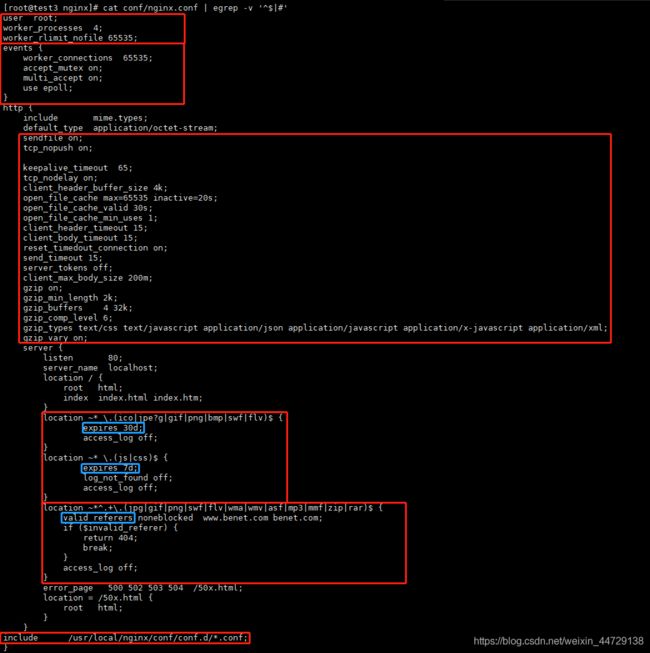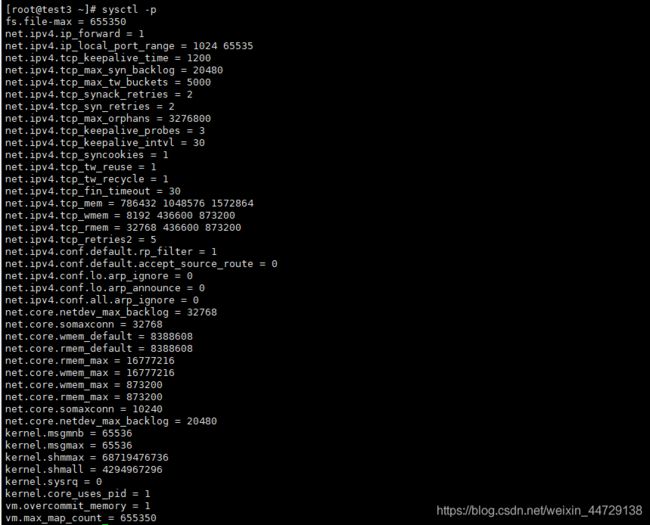nginx部署、配置优化
nginx安装
安装依赖
yum -y install gcc gcc-c++ make unzip pcre pcre-devel zlib zlib-devel libxml2 libxml2-devel readline readline-devel ncurses ncurses-devel perl-devel perl-ExtUtils-Embed openssl-devel bash-complation net-tools lrzsz upzip zip
下载软件包
wget http://nginx.org/download/nginx-1.16.1.tar.gz -o /usr/local
解压、编译和安装
cd /usr/local
tar -xf nginx-1.16.1.tar.gz
cd nginx-1.16.1
./configure --prefix=/usr/local/nginx --with-http_stub_status_module --with-http_ssl_module --with-http_flv_module --with-http_gzip_static_module --with-stream
make
make install
配置优化
参考链接:https://www.cnblogs.com/xuxubaobao/p/10863464.html
优化的配置点有:nginx的运行用户、nginx运行工作进程个数、nginx最多可以打开文件数、nginx事件处理模型、开启高效传输模式、连接超时时间、fastcgi调优、gzip调优、expires缓存调优、防盗链、内核参数优化、系统连接数优化等。
nginx配置优化:nginx.conf
cd /usr/local/nginx/conf
cat nginx.conf
user root;
#修改为root级别,最大权限
worker_processes 4;
#工作进程,设置为本机cpu核数的一半即可,cpu核数查看:cat /proc/cpuinfo|grep processor | wc -l
#error_log logs/error.log;
#error_log logs/error.log notice;
#error_log logs/error.log info;
#pid logs/nginx.pid;
worker_rlimit_nofile 65535;
#Nginx最多可以打开文件数,与ulimit -n的值保持一致即可,参考/etc/security/limits.conf的nofile配置
events {
#Nginx事件处理模型
worker_connections 65535;
accept_mutex on;
multi_accept on;
#默认是on,设置为on后,多个worker按串行方式来处理连接,也就是一个连接只有一个worker被唤醒,其他的处于休眠状态,设置为off后,多个worker按并行方式来处理连接,也就是一个连接会唤醒所有的worker,直到连接分配完毕,没有取得连接的继续休眠。当你的服务器连接数不多时,开启这个参数会让负载有一定的降低,但是当服务器的吞吐量很大时,为了效率,可以关闭这个参数。
use epoll;
#epoll事件模型,处理效率高
}
http {
include mime.types;
default_type application/octet-stream;
#log_format main '$remote_addr - $remote_user [$time_local] "$request" '
# '$status $body_bytes_sent "$http_referer" '
# '"$http_user_agent" "$http_x_forwarded_for"';
#access_log logs/access.log main;
sendfile on;
#开启高效文件传输模式,sendfile指令指定nginx是否调用sendfile函数来输出文件,对于普通应用设为on,如果用来进行下载等应用磁盘IO重负载应用,可设置为off,以平衡磁盘与网络I/O处理速度,降低系统的负载。注意:如果图片显示不正常把这个改成off。
tcp_nopush on;
#必须在sendfile开启模式才有效,防止网路阻塞,积极的减少网络报文段的数量(将响应头和正文的开始部分一起发送,而不一个接一个的发送。)
#keepalive_timeout 0;
keepalive_timeout 65;
#客户端连接保持会话超时时间,超过这个时间,服务器断开这个链接
tcp_nodelay on;
#防止网络阻塞,不过要包涵在keepalived参数才有效
client_header_buffer_size 4k;
#客户端请求头部的缓冲区大小,这个可以根据你的系统分页大小来设置,一般一个请求头的大小不会超过 1k,不过由于一般系统分页都要大于1k,所以这里设置为分页大小。分页大小可以用命令getconf PAGESIZE查看。
open_file_cache max=65535 inactive=20s;
#打开文件指定缓存,默认是没有启用的,max指定缓存数量,建议和打开文件数一致,inactive 是指经过多长时间文件没被请求后删除缓存
open_file_cache_valid 30s;
#多长时间检查一次缓存的有效信息
open_file_cache_min_uses 1;
#指令中的inactive 参数时间内文件的最少使用次数,如果超过这个数字,文件描述符一直是在缓存中打开的,如上例,如果有一个文件在inactive 时间内一次没被使用,它将被移除。
client_header_timeout 15;
#设置请求头的超时时间,我们也可以把这个设置低些,如果超过这个时间没有发送任何数据,nginx将返回request time out的错误。
client_body_timeout 15;
#设置请求体的超时时间,我们也可以把这个设置低些,超过这个时间没有发送任何数据,和上面一样的错误提示。
reset_timedout_connection on;
#告诉nginx关闭不响应的客户端连接,这将会释放那个客户端所占有的内存空间。
send_timeout 15;
#响应客户端超时时间,这个超时时间仅限于两个活动之间的时间,如果超过这个时间,客户端没有任何活动,nginx关闭连接
server_tokens off;
#并不会让nginx执行的速度更快,但它可以关闭在错误页面中的nginx版本数字,这样对于安全性是有好处的。
client_max_body_size 200m;
#上传文件大小限制
gzip on;
#开启压缩功能
gzip_min_length 2k;
#设置允许压缩的页面最小字节数,页面字节数从header头的Content-Length中获取,默认值是0,不管页面多大都进行压缩,建议设置成大于1K,如果小与1K可能会越压越大。
gzip_buffers 4 32k;
#压缩缓冲区大小,表示申请4个单位为32K的内存作为压缩结果流缓存,默认值是申请与原始数据大小相同的内存空间来存储gzip压缩结果。
gzip_comp_level 6;
#压缩比例,用来指定GZIP压缩比,1压缩比最小,处理速度最快,9压缩比最大,传输速度快,但是处理慢,也比较消耗CPU资源。
gzip_types text/css text/javascript application/json application/javascript application/x-javascript application/xml;
#用来指定压缩的类型,‘text/html’类型总是会被压缩;gzip_types text/html (默认不对js/css文件进行压缩),无论是否指定text/html默认已经压缩 ;不能用通配符 text/*
gzip_vary on;
#varyheader支持,改选项可以让前端的缓存服务器缓存经过GZIP压缩的页面,例如用Squid缓存经过nginx压缩的数据。
fastcgi_connect_timeout 600;
#指定连接到后端FastCGI的超时时间。
fastcgi_send_timeout 600;
#向FastCGI传送请求的超时时间。
fastcgi_read_timeout 600;
#指定接收FastCGI应答的超时时间。
fastcgi_buffer_size 64k;
#指定读取FastCGI应答第一部分需要用多大的缓冲区,默认的缓冲区大小为fastcgi_buffers指令中的每块大小,可以将这个值设置更小。
fastcgi_buffers 4 64k;
#指定本地需要用多少和多大的缓冲区来缓冲FastCGI的应答请求,如果一个php脚本所产生的页面大小为256KB,那么会分配4个64KB的缓冲区来缓存,如果页面大小大于256KB,那么大于256KB的部分会缓存到fastcgi_temp_path指定的路径中,但是这并不是好方法,因为内存中的数据处理速度要快于磁盘。一般这个值应该为站点中php脚本所产生的页面大小的中间值,如果站点大部分脚本所产生的页面大小为256KB,那么可以把这个值设置为“8 32K”、“4 64k”等。
fastcgi_busy_buffers_size 128k;
#建议设置为fastcgi_buffers的两倍,繁忙时候的buffer
fastcgi_temp_file_write_size 128k;
#在写入fastcgi_temp_path时将用多大的数据块,默认值是fastcgi_buffers的两倍,该数值设置小时若负载上来时可能报502BadGateway
fastcgi_temp_path /usr/local/nginx/nginx_tmp;
#缓存临时目录
fastcgi_intercept_errors on;
#这个指令指定是否传递4xx和5xx错误信息到客户端,或者允许nginx使用error_page处理错误信息。
fastcgi_cache_path /usr/local/nginx/fastcgi_cache levels=1:2 keys_zone=cache_fastcgi:128m inactive=1d max_size=10g;
#fastcgi_cache缓存目录,可以设置目录层级,比如1:2会生成16*256个子目录,cache_fastcgi是这个缓存空间的名字,cache是用多少内存(这样热门的内容nginx直接放内存,提高访问速度),inactive表示默认失效时间,如果缓存数据在失效时间内没有被访问,将被删除,max_size表示最多用多少硬盘空间。
fastcgi_cache cache_fastcgi;
#表示开启FastCGI缓存并为其指定一个名称。开启缓存非常有用,可以有效降低CPU的负载,并且防止502的错误放生。cache_fastcgi为proxy_cache_path指令创建的缓存区名称
fastcgi_cache_valid 200 302 1h;
#用来指定应答代码的缓存时间,实例中的值表示将200和302应答缓存一小时,要和fastcgi_cache配合使用
fastcgi_cache_valid 301 1d;
#将301应答缓存一天
fastcgi_cache_valid any 1m;
#将其他应答缓存为1分钟
fastcgi_cache_min_uses 1;
#该指令用于设置经过多少次请求的相同URL将被缓存。
fastcgi_cache_key http://$host$request_uri;
#该指令用来设置web缓存的Key值,nginx根据Key值md5哈希存储.一般根据$host(域名)、$request_uri(请求的路径)等变量组合成proxy_cache_key 。
#fastcgi_pass;
#指定FastCGI服务器监听端口与地址,可以是本机或者其它
#总结:
#nginx的缓存功能有:proxy_cache / fastcgi_cache
#proxy_cache的作用是缓存后端服务器的内容,可能是任何内容,包括静态的和动态。
#fastcgi_cache的作用是缓存fastcgi生成的内容,很多情况是php生成的动态的内容。
#proxy_cache缓存减少了nginx与后端通信的次数,节省了传输时间和后端宽带。
#fastcgi_cache缓存减少了nginx与php的通信的次数,更减轻了php和数据库(mysql)的压力。
#CGI是为了保证web server传递过来的数据是标准格式的,方便CGI程序的编写者。Fastcgi是用来提高CGI程序性能的。php-fpm是fastcgi进程的管理器,用来管理fastcgi进程的
server {
listen 80;
server_name localhost;
#charset koi8-r;
#access_log logs/host.access.log main;
location / {
root html;
index index.html index.htm;
}
#缓存,主要针对于图片,css,js等元素更改机会比较少的情况下使用,特别是图片,占用带宽大,我们完全可以设置图片在浏览器本地缓存365d,css,js,html可以缓存个10来天,这样用户第一次打开加载慢一点,第二次,就非常快了。缓存的时候,我们需要将需要缓存的拓展名列出来,expires缓存配置在server字段里面。
#expire功能优点
#1、expires可以降低网站购买的带宽,节约成本
#2、同时提升用户访问体验
#3、减轻服务的压力,节约服务器成本,是web服务非常重要的功能。
#expire功能缺点
#1、被缓存的页面或数据更新了,用户看到的可能还是旧的内容,反而影响用户体验
#解决办法:
#1、第一个缩短缓存时间,例如:1天,但不彻底,除非更新频率大于1天
#2、第二个对缓存的对象改名。
location ~* \.(ico|jpe?g|gif|png|bmp|swf|flv)$ {
expires 30d;
#log_not_found off;
access_log off;
}
location ~* \.(js|css)$ {
expires 7d;
log_not_found off;
access_log off;
}
#注:log_not_found off;是否在error_log中记录不存在的错误。默认是。
#防止别人直接从你网站引用图片等链接,消耗了你的资源和网络流量,那么我们的解决办法由几种:
#1、水印,品牌宣传,你的带宽,服务器足够
#2、防火墙,直接控制,前提是你知道IP来源
#3、防盗链策略下面的方法是直接给予404的错误提示
#参数可以使如下形式:
#none 意思是不存在的Referer头(表示空的,也就是直接访问,比如直接在浏览器打开一个图片)
#blocked 意为根据防火墙伪装Referer头,如:“Referer:XXXXXXX”。
#server_names 为一个或多个服务器的列表,0.5.33版本以后可以在名称中使用“*”通配符。
location ~*^.+\.(jpg|gif|png|swf|flv|wma|wmv|asf|mp3|mmf|zip|rar)$ {
valid_referers noneblocked www.benet.com benet.com;
if ($invalid_referer) {
#return 302 http://www.benet.com/img/nolink.jpg;
return 404;
break;
}
access_log off;
}
#error_page 404 /404.html;
# redirect server error pages to the static page /50x.html
#
error_page 500 502 503 504 /50x.html;
location = /50x.html {
root html;
}
# proxy the PHP scripts to Apache listening on 127.0.0.1:80
#
#location ~ \.php$ {
# proxy_pass http://127.0.0.1;
#}
# pass the PHP scripts to FastCGI server listening on 127.0.0.1:9000
#
#location ~ \.php$ {
# root html;
# fastcgi_pass 127.0.0.1:9000;
# fastcgi_index index.php;
# fastcgi_param SCRIPT_FILENAME /scripts$fastcgi_script_name;
# include fastcgi_params;
#}
# deny access to .htaccess files, if Apache's document root
# concurs with nginx's one
#
#location ~ /\.ht {
# deny all;
#}
}
# another virtual host using mix of IP-, name-, and port-based configuration
#
#server {
# listen 8000;
# listen somename:8080;
# server_name somename alias another.alias;
# location / {
# root html;
# index index.html index.htm;
# }
#}
# HTTPS server
#
#server {
# listen 443 ssl;
# server_name localhost;
# ssl_certificate cert.pem;
# ssl_certificate_key cert.key;
# ssl_session_cache shared:SSL:1m;
# ssl_session_timeout 5m;
# ssl_ciphers HIGH:!aNULL:!MD5;
# ssl_prefer_server_ciphers on;
# location / {
# root html;
# index index.html index.htm;
# }
#}
include /usr/local/nginx/conf/conf.d/*.conf;
#include 优化,在conf下创建子目录的方式配置新的分支配置文件
}
cd /usr/local/nginx
cat conf/nginx.conf | egrep -v '^$|#'
服务器内核参数优化:/etc/sysctl.conf
cat > /etc/sysctl.conf <<EOF
fs.file-max = 655350
#系统打开的最大文件数
net.ipv4.ip_forward = 1
#开启转发
net.ipv4.ip_local_port_range= 1024 65535
#表示用于向外连接的端口范围。缺省情况下很小,改为1024到65535。
net.ipv4.tcp_keepalive_time= 1200
#表示当keepalive起用的时候,TCP发送keepalive消息的频度。缺省是2小时,改为20分钟。
net.ipv4.tcp_max_syn_backlog= 20480
#表示SYN队列的长度,默认为1024,加大队列长度为8192,可以容纳更多等待连接的网络连接数。
net.ipv4.tcp_max_tw_buckets= 5000
#表示系统同时保持TIME_WAIT的最大数量,如果超过这个数字,TIME_WAIT将立刻被清除并打印警告信息。默认为180000,改为5000。此项参数可以控制TIME_WAIT的最大数量,只要超出了。
net.ipv4.tcp_synack_retries= 2
#为了打开对端的连接,内核需要发送一个SYN并附带一个回应前面一个SYN的ACK。也就是所谓三次握手中的第二次握手。这个设置决定了内核放弃连接之前发送SYN+ACK包的数量。
net.ipv4.tcp_syn_retries= 2
#在内核放弃建立连接之前发送SYN包的数量。
net.ipv4.tcp_max_orphans= 3276800
#系统中最多有多少个TCP套接字不被关联到任何一个用户文件句柄上,如果超过这个数字,连接将即刻被复位并打印出警告信息,这个限制仅仅是为了防止简单的DoS攻击,不能过分依靠它或者人为地减小这个值,更应该增加这个值(如果增加了内存之后)。
net.ipv4.tcp_keepalive_probes = 3
net.ipv4.tcp_keepalive_intvl = 30
net.ipv4.tcp_syncookies= 1
#表示开启SYNCookies。当出现SYN等待队列溢出时,启用cookies来处理,可防范少量SYN攻击,默认为0,表示关闭;
net.ipv4.tcp_tw_reuse= 1
#表示开启重用。允许将TIME-WAITsockets重新用于新的TCP连接,默认为0,表示关闭;
net.ipv4.tcp_tw_recycle= 1
#表示开启TCP连接中TIME-WAITsockets的快速回收,默认为0,表示关闭;
net.ipv4.tcp_fin_timeout= 30
#修改系統默认的TIMEOUT 时间。
net.ipv4.tcp_mem = 786432 1048576 1572864
#同样有3个值,意思是:
#net.ipv4.tcp_mem[0]:低于此值,TCP没有内存压力。
#net.ipv4.tcp_mem[1]:在此值下,进入内存压力阶段。
#net.ipv4.tcp_mem[2]:高于此值,TCP拒绝分配socket。
#上述内存单位是页,而不是字节。可参考的优化值是:786432 1048576 1572864
net.ipv4.tcp_wmem = 8192 436600 873200
#TCP写buffer,可参考的优化值:8192 436600 873200
net.ipv4.tcp_rmem = 32768 436600 873200
#TCP读buffer,可参考的优化值:32768 436600 873200
net.ipv4.tcp_retries2 = 5
net.ipv4.conf.default.rp_filter = 1
net.ipv4.conf.default.accept_source_route = 0
net.ipv4.conf.lo.arp_ignore = 0
net.ipv4.conf.lo.arp_announce = 0
net.ipv4.conf.all.arp_ignore = 0
net.core.netdev_max_backlog= 32768
#每个网络接口接收数据包的速率比内核处理这些包的速率快时,允许送到队列的数据包的最大数目。
net.core.somaxconn= 32768
#例如web应用中listen函数的backlog默认会给我们内核参数的net.core.somaxconn限制到128,而nginx定义的NGX_LISTEN_BACKLOG默认为511,所以有必要调整这个值。
net.core.wmem_default= 8388608
net.core.rmem_default= 8388608
net.core.rmem_max= 16777216
#最大socket读buffer,可参考的优化值:873200
net.core.wmem_max= 16777216
#最大socket写buffer,可参考的优化值:873200
net.core.wmem_max = 873200
net.core.rmem_max = 873200
net.core.somaxconn = 10240
net.core.netdev_max_backlog = 20480
kernel.msgmnb = 65536
kernel.msgmax = 65536
kernel.shmmax = 68719476736
kernel.shmall = 4294967296
kernel.sysrq = 0
kernel.core_uses_pid = 1
vm.overcommit_memory = 1
vm.max_map_count = 655350
EOF
sysctl -p #执行生效
系统连接数的优化:/etc/security/limits.conf
cat > /etc/security/limits.conf <<EOF
#进程的最大数目优化
* soft nproc 20480
* hard nproc 20480
#打开文件的最大数目优化,root用户和其他用户
root soft nofile 655350
root hard nofile 655350
* soft nofile 655350
* hard nofile 655350
#用户级别的锁内存优化
isi soft memlock unlimited
isi hard memlock unlimited
EOF
启动nginx、并设置开机自启
启动nginx,并访问测试
cd /usr/local/nginx
./sbin/nginx -t #校验配置文件
./sbin/nginx #启动nginx
netstat -tanlp |grep nginx #查看nginx的监听端口
ps -ef |grep nginx #查看nginx的启动进程
设置开启自启
cat > /etc/init.d/nginxd <<EOF
#!/bin/bash
#chkconfig: 2345 35 80
#description: nginx
#processname: nginx
nginx_home="/usr/local/nginx"
case "$1" in
start)
${nginx_home}/sbin/nginx
echo "$(date) nginx is started" >> ${nginx_home}/nginx-status.log
;;
stop)
${nginx_home}/sbin/nginx -s stop
echo "$(date) nginx is stopped" >> ${nginx_home}/nginx-status.log
;;
reload)
${nginx_home}/sbin/nginx -s reload
echo "$(date) nginx is restarted" >> ${nginx_home}/nginx-status.log
;;
status)
nginx_pid_num=$(ps -ef |grep nginx |egrep "master|work"|grep -v grep |wc -l)
if [ $nginx_pid_num -ne 0 ];then
echo "$(date) nginx is running"
else
echo "$(date) nginx is stopped"
fi
;;
*)
echo "Usage: $0 {start|stop|reload|status}"
;;
esac
EOF
chmod +x /etc/init.d/nginxd
chkconfig --add /etc/init.d/nginxd
chkconfig --list nginxd
附带个人完整的一版nginx配置文件
#################################### 用户级别、work数、事件优化 ####################################
user root;
worker_processes 4;
worker_rlimit_nofile 65535;
events {
worker_connections 65535;
accept_mutex on;
multi_accept on;
use epoll;
}
http {
include mime.types;
default_type application/octet-stream;
#################### 高效传输模式、连接超时时间、fastcgi调优、gzip调优 #############################
sendfile on;
tcp_nopush on;
########################################## 高效传输模式 ############################################
keepalive_timeout 65;
tcp_nodelay on;
open_file_cache max=65535 inactive=20s;
open_file_cache_valid 30s;
open_file_cache_min_uses 1;
client_header_timeout 15;
client_body_timeout 15;
reset_timedout_connection on;
send_timeout 15;
server_tokens off;
client_max_body_size 200m;
########################################### gzip调优 ###############################################
gzip on;
gzip_min_length 2k;
gzip_buffers 4 32k;
gzip_comp_level 6;
gzip_types text/css text/javascript application/json application/javascript application/x-javascript application/xml;
gzip_vary on;
###################################### fastcgi调优,可以不配置 #######################################
fastcgi_connect_timeout 600;
fastcgi_send_timeout 600;
fastcgi_read_timeout 600;
fastcgi_buffer_size 64k;
fastcgi_buffers 4 64k;
fastcgi_busy_buffers_size 128k;
fastcgi_temp_file_write_size 128k;
fastcgi_temp_path /usr/local/nginx/nginx_tmp;
fastcgi_intercept_errors on;
fastcgi_cache_path /usr/local/nginx/fastcgi_cache levels=1:2 keys_zone=cache_fastcgi:128m inactive=1d max_size=10g;
fastcgi_cache cache_fastcgi;
fastcgi_cache_valid 200 302 1h;
fastcgi_cache_valid 301 1d;
fastcgi_cache_valid any 1m;
fastcgi_cache_min_uses 1;
fastcgi_cache_key http://$host$request_uri;
server {
listen 80;
server_name localhost;
location / {
root html;
index index.html index.htm;
}
################################## 可以不配置 ####################################
location ~* \.(js|css)$ {
expires 7d;
log_not_found off;
access_log off;
}
location ~*^.+\.(jpg|gif|png|swf|flv|wma|wmv|asf|mp3|mmf|zip|rar)$ {
valid_referers noneblocked www.benet.com benet.com;
if ($invalid_referer) {
return 404;
break;
}
access_log off;
}
################################################################################
error_page 500 502 503 504 /50x.html;
location = /50x.html {
root html;
}
}
include /usr/local/nginx/conf/conf.d/*.conf;
}



